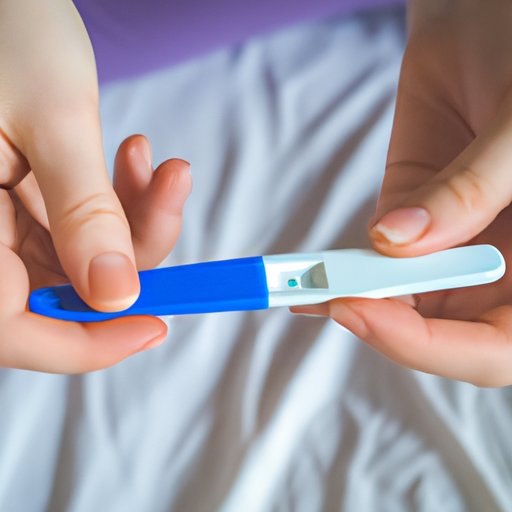
Introduction
Knowing whether or not you are pregnant is a crucial first step towards a healthy and successful pregnancy. The earlier you find out that you’re pregnant, the sooner you can start taking steps to ensure your health and the health of your baby. In this article, we’ll explore the early signs of pregnancy, at-home and doctor-recommended pregnancy tests, fertility and pregnancy, as well as possible complications that can arise from delayed pregnancy diagnosis.
Early Signs of Pregnancy: What to Look Out For
There are several physical and emotional symptoms that can indicate that you might be pregnant. Here are some of the most common signs:
- Missed period
- Morning sickness (nausea and vomiting)
- Breast changes (swelling, tenderness, and darkening of the areola)
- Increased fatigue
- Food cravings and aversions
- Mood swings (irritability, emotional, and anxious)
- Heightened sense of smell
It’s important to keep in mind that while these signs can indicate pregnancy, they can also be caused by other factors such as stress, illness, or hormonal imbalances. If you experience any of these symptoms, it’s a good idea to take a pregnancy test to confirm.
Taking a Home Pregnancy Test: When and How to Do It
Home pregnancy tests can be purchased at most drug stores and are generally easy to use. Here are the steps to follow:
- Read the instructions carefully before starting the test. Make sure you understand the process and the time needed to complete it.
- Collect a urine sample in a clean container. The first urine of the morning is usually the best time to test as it contains the highest concentration of the hormone hCG.
- Dip the testing stick into the urine sample or use a dropper to apply a few drops of urine onto the test strip.
- Wait for the recommended time before reading the test. Most tests will indicate a positive result with two lines, while a negative result will only show one line.
- If the test is positive, make an appointment with your healthcare provider to confirm the results.
The ideal time to take a pregnancy test is one week after a missed period, as this is when hormone levels are high enough to be detected. However, some tests can detect pregnancy as early as a few days before a missed period. It’s important to follow the instructions of the specific test you are using to ensure accurate results.
Doctor-Recommended Pregnancy Tests and Medical Exams
While home pregnancy tests can be a good first step in confirming pregnancy, they only detect the presence of the hormone hCG. Healthcare providers often use additional tests and exams to diagnose pregnancy and monitor maternal and fetal health. Here are some of the most common tests:
- Urine test: Similar to a home pregnancy test, doctors can perform a urine test as well to confirm pregnancy.
- Blood test: A blood test can detect pregnancy earlier than a urine test and can also measure the level of hCG in the blood to monitor pregnancy progress.
- Ultrasound: An ultrasound can confirm pregnancy and determine the due date as well as check for any fetal abnormalities.
- Amniocentesis: A test done during the second trimester to detect any potential chromosomal abnormalities.
It’s important to discuss with your healthcare provider which tests are recommended for your individual situation and to follow any instructions for preparation and aftercare.
Fertility and Pregnancy: How Knowing Your Body Can Help You
Understanding your menstrual cycle and ovulation patterns can be crucial for fertility and pregnancy. The menstrual cycle is the process by which a woman’s body prepares for pregnancy, and ovulation occurs when the ovaries release an egg. Knowing when you are most fertile can help increase your chances of getting pregnant.
There are several methods for tracking your menstrual cycle and ovulation, including calendar tracking, basal body temperature monitoring, and ovulation predictor kits. By tracking your cycle and ovulation, you can increase your chances of getting pregnant and also be more aware of any changes or irregularities that could indicate pregnancy.
Possible Complications: Why It’s Important to Know if You’re Pregnant Early On
Delayed pregnancy diagnosis can increase the risk of complications for both maternal and fetal health. Here are some possible complications that can occur:
- Ectopic pregnancy: A pregnancy that occurs outside of the uterus and can be life-threatening if not diagnosed early.
- Miscarriage: The loss of pregnancy before the 20th week, which can be caused by various factors including chromosomal abnormalities, infection, trauma, or hormonal imbalances.
- Maternal health complications: High blood pressure, gestational diabetes, preeclampsia, and other medical conditions can occur during pregnancy and can be managed more effectively with early detection.
It’s important to seek medical advice and care as soon as possible if you suspect you might be pregnant to ensure early detection and monitoring of potential complications.
Conclusion
Knowing if you’re pregnant early on is critical for a healthy and successful pregnancy. By understanding the early signs and symptoms, taking at-home and doctor-recommended pregnancy tests, tracking your menstrual cycle and ovulation, and seeking medical advice and care as soon as possible, you can help ensure the best possible outcome for you and your baby. For additional resources and support, consult with your healthcare provider or visit trusted websites such as the American Pregnancy Association or the Mayo Clinic.





